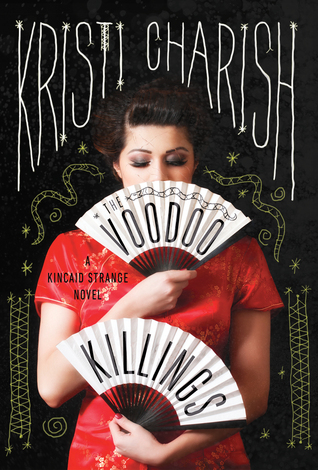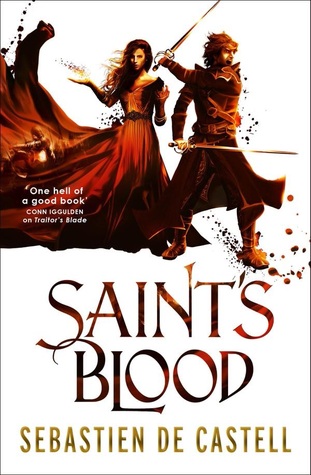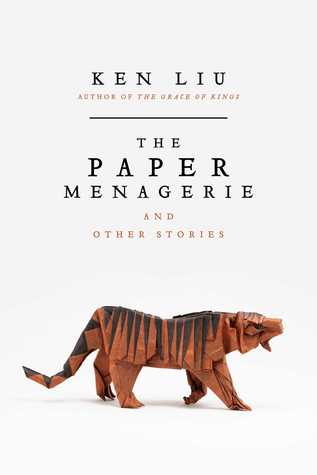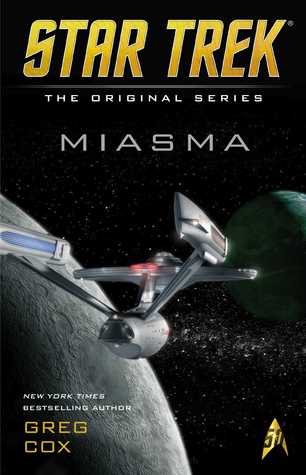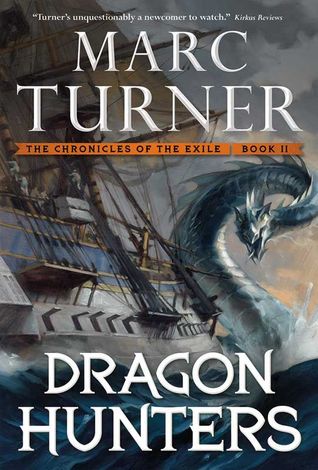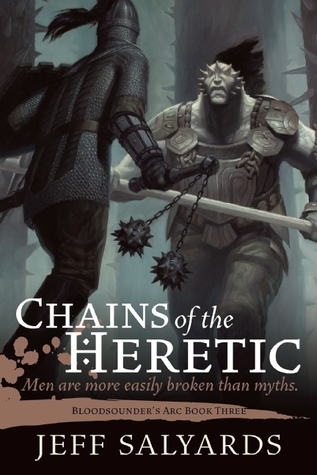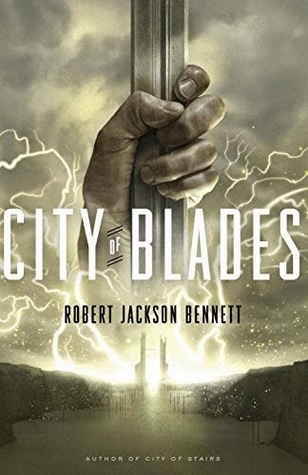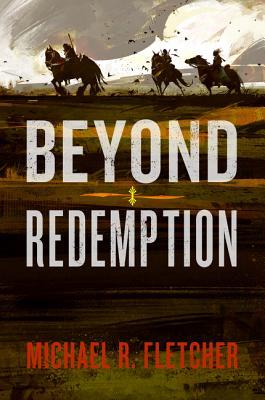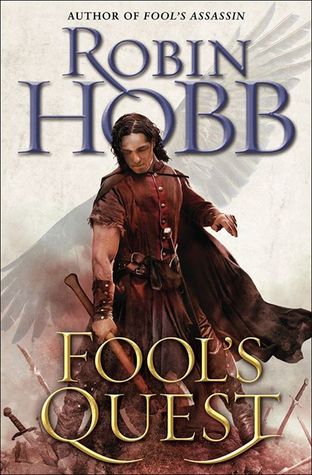Sometimes you step tentatively into a book, not quite sure where the intersection of your hopes and expectations will lie. Urban Fantasy is not generally a must-read genre for me, but I’ve become a fan of Kristi Charish’s Adventures of Owl. Having said that, however, I know that much of the appeal in that series (for me, at least) is in the archaeology and the mythology. As such, I really wasn’t sure if I was up for a more, for lack of a better word, generic urban fantasy. Well, let me spare you the suspense and declare that The Voodoo Killings marks the start of another fantastic series – one that I wouldn’t have otherwise been drawn to, but which I am very glad I was. It’s a ghost story with a twist, and a voodoo tale with far more depth than even a fan of her work might expect. Strange is a very different sort of heroine than Owl, more likable in personality and more deliberate in her planning, but still just as compelling. Where the book really began to win me over, though, was with our first trip into Seattle’s Underground City – and not the one tourists get to explore. There’s some real world building here, establishing…
Talk about your emotional roller coasters. I started out clutching the side of my e-reader with anticipatory glee, loving the sheer excitement of each new development . . . until I hit the point where I wanted to hurl it across the room as I cursed the name Sebastien de Castell . . . before I found myself holding it in shaky hands as I bravely tried to deny that a book was on the verge of making a grown man cry. “Time to stick the pointy end through the bad man’s heart.” If you thought the first two books were great (and Knight’s Shadow was one of my favorite books last year) then be prepared to have the bar raised impossibly high with Saint’s Blood. Falcio suffers more here than any other hero in recent memory – and that’s saying something, considering what he endured with the Greatcoat’s Lament last time around. He’s still suffering from that torture as the book begins, haunted day and night by his seemingly endless torment . . . and his anguish just gets deeper. He’s a man both physically exhausted and emotionally broken, kept alive by nothing more than the slender threads of love and devotion. Even that’s not enough,…
As much as I wanted to love The Paper Menagerie and Other Stories, I have to be honest in that I only thought it was okay. I mean, I can see how these stories established a reputation for Ken Liu, and there’s no doubt that some of them are indeed award worthy, but I didn’t connect with nearly as many as I would have liked. Before you start getting disappointed, however, let me say that I blame the format, not necessarily the content. I’ve always been drawn to doorstopper fantasy novels like The Grace of Kings, where we have six or seven hundred pages to immerse ourselves in the world, so it’s not a surprise that many of these stories fell flat or felt a little shallow. Having said all that, I’d be remiss if I didn’t heap some praise on those stories that did work for me. “State Change” hooked me from the start, with a young woman’s strange obsession with freezers, glaciers, and ice cubes. Rina lives in a world where our souls physically manifest as small items that we must keep close at all times, which is easy enough if your soul is a rock or a…
When it comes to media tie-ins – whether it be movie, television, or comic book – one name that consistent comes to mind is Greg Cox. Winner of 3 Scribe Awards from the International Association of Media Tie-In Writers, Cox has adapted everything from The Avengers, Batman, and Buffy, to Xena, The X-Files, and X-Men. He is also the author of two dozen novels and short stories in the various Star Trek universes, with Miasma being his first Star Trek e-book. The plot itself is simple, with Spock, McCoy, Chekov, and a few red-shirts sent to investigate an alien signal coming from an unexplored planet. Things begin to go wrong from the start, when their shields produce an explosive reaction in the atmosphere, and then quickly get worse when they crash their shuttle craft in the middle of a swamp. As if that weren’t enough, their phasers are just as dangerous in the planet’s atmosphere, their communicators are useless, and there are massive, man-eating leech-like monsters hunting them in the mist. In many ways, this plays like an sci-fi horror story, more akin to the Alien or Predator franchises than Star Trek, but Cox’s mastery of the characters, the mythology, and the humor of the series makes it…
Today we are excited to share an interview with Marc Turner, author of The Chronicles of Exile. The second book in the series, Dragon Hunters, released yesterday February 9th, 2016. If you missed it, be sure to check out our review. Marc Turner is the author of the epic fantasy series, The Chronicles of the Exile. Book one, When The Heavens Fall, was published in 2015. Book two, Dragon Hunters, is out in the US and the UK in February 2016 Book three, Red Tide, will follow in September 2016. INTERVIEW Q: Thanks for taking the time to stop by today, Marc. For those readers who have yet to discover the awesomeness that is The Chronicles of the Exile, please feel free to introduce yourself. A: Thanks for having me. I’m Marc Turner, and I write epic fantasy novels with a dark edge, of which When the Heavens Fall was my first. The second book, Dragon Hunters, has just been published by Tor in the US and Titan in the UK, and it features Chameleon priests, dimension-hopping assassins, and sea dragons being hunted for sport. When I’m not writing, I’m doing more writing, reading, playing computer…
If you were a fan of When the Heavens Fall, then be prepared for an abrupt change with Dragon Hunters. For the second book of The Chronicle of the Exile, Marc Turner shifts location, characters, and story line. It’s still the same recognizable narrative voice, and the mythology ties the two books together, but it makes for a very different read . . . one that takes on a entirely new flavor. Having said that, if you’ve yet to encounter Turner’s work, then that same shift means this second book is just as accessible to new readers as the first. Personally, I found this second volume a little more difficult to get into than the first. Call me old-fashioned, but I like my darkened alleys, haunted forests, and subterranean lairs. It’s classic (perhaps even clichéd) epic fantasy, but those elements were largely responsible for me celebrating the first as something of a throwback fantasy. That’s not to say there’s anything wrong with this second volume, or that it doesn’t grow on you, it just the sunny seaside setting didn’t have the same initial impact. Senar Sol, Guardian, is our first real POV character in the novel. He’s as much a challenge as he is a mystery,…
While I enjoyed Scourge of the Betrayer, the first book of Bloodsounder’s Arc, it was Veil of the Deserters that really opened my eyes to what Jeff Salyards was capable of. Not only did it overcome the dreaded middle-book curse, it actually proved to be one of those rare sequels that completely surpass the first. I came away from it thoroughly satisfied, but also hungry for more. That brings us to Chains of the Heretic, the third and final book of Bloodsounder’s Arc. Where that second volume expanded upon the world and the story of the first, this one rips that world wide open and shoves us headlong into a whole new heap of betrayals. More importantly, where that second book was a textbook example of how you build to a climax, Chains of the Heretic schools the genre on how you successfully deliver it. Seriously, it is that good. As much as I’d love to gush about what Salyards did with the larger storyline and the overall mythology, just about anything I could say here would constitute a spoiler. What I will say is that a lot happens in this book, and it all has significant consequences for our band of…
As much as I came to see City of Stairs, the first book of The Divine Cities, as a remarkable multi-genre crossover success, it took me a while to warm up to it. In fact, at one point I put the book down with no intention of finishing it. What a mistake that would have been. I’m glad I decided to give it one more chance, because something just ‘clicked’ for me, bringing the whole jumbled mythological tapestry together. In the end, it turned out to be one of my favorite books of the year. Fortunately, there was no such hesitation or doubt involved with City of Blades. This is a book that hooked me from the first chapter and kept me reading at a frantic pace. I devoured the first 180 pages on a Friday night, and then binged my way through the rest over the weekend. While I’m sure familiarity with the world and the mythology helped (there was a steep learning curve with the first book), it was the shift in point-of-view that really made this second book so immediately accessible. Shara Thivani is kept largely off the page here, appearing only in a few scattered scenes, leaving General Turyin Mulaghesh to carry the tale. Mulaghesh…
R. Scott Bakker. Steven Erikson. Peter Watts. When you think of dark, epic, mind-bending genre fiction from north of the 49th parallel, these gentlemen are the undisputed masters. It may be uncharacteristically bold and presumptuous to demand that a new name be added to that list so soon in his career, but I’ll be damned if Michael R. Fletcher hasn’t earned it. Seriously, Beyond Redemption really is that good. If our world is defined by delusion, there can be no truth. If there is no truth, how can there be lies? When I first snagged an ARC of this about six months ago, I was definitely intrigued . . . but hesitant. Building an epic fantasy around madness, faith, and delusion sounded very cool. I was optimistic, but I also had my doubts. We’re talking high-concept here, and I was worried that the narrative would suffer from the strain of trying to sustain the threads of madness. In fact, I’d almost talked myself out of taking that chance when, on a whim, I decided to give the first few chapters a cursory read. A few vulgar, violent, vehement exclamations of approval later, I was well-and-truly hooked. Beyond Redemption absolutely blew…
At one time, the second (or middle) book of a trilogy was a thing to be dreaded – a book to be endured as a necessary sort of narrative bridge, with the built-in expectation that any lack of enjoyment is to be tempered by anticipation for the concluding book to follow. While there have been a few ‘new’ authors (such as Jeff Salyards and Sebastien de Castell) who have bucked that trend, I really didn’t expect the same from an established author like Robin Hobb. After all, her style and her writing are already polished, and she had her growth/development moments almost 20 years and 20 books ago. Whether or not Fool’s Assassin was a stumble depends on who you ask, but I had serious issues with the pacing, the characters, and a few of the core plot elements. It was one of my most disappointing reads of last year, and almost soured me on the whole Realms of the Elderlings saga. Hobb had a serious uphill battle for my appreciation going into the second/middle book of this series, and I tempered my expectations accordingly. So, you can imagine my surprise when Fool’s Quest not only proved to be a…

